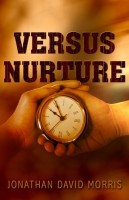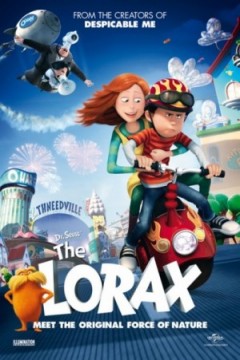
Anyone who read Dr. Seuss’s The Lorax as a kid might dread the movie version. No one really needs another moralizing, hectoring lecture from environmentalists on the need to save the trees from extinction, especially since that once-fashionable cause seems ridiculously overwrought today. There is no shortage of trees and this is due not to nationalization so much as the privatization and cultivation of forest land.
And yet, even so, the movie is stunning and beautiful in every way, with a message that taps into something important, something with economic and political relevance for us today. In fact, the movie improves on the book with the important addition of “Thneed-Ville,” a community of people who live in a completely artificial world lorded over by a mayor who also owns the monopoly on oxygen.
This complicates the relatively simple narrative of the book, which offers a story of a depleted environment that doesn’t actually make much sense. The original posits an entrepreneur who discovers that he can make a “Thneed” — a kind of all-purpose cloth — out of the tufts of the “Truffula Tree,” and that this product is highly marketable.
Now, in real life, any capitalist in this setting would know exactly what to do: immediately get to work planting and cultivating more Truffula trees. This is essential capital that makes the business possible and sustainable through time. You want more rather than less capital. An egg producer doesn’t kill his chickens; he breeds more. But in the book (and the movie), the capitalist does the opposite. He cuts down all the trees and, surprise, his business goes bust.
The book ends with the aging capitalist regretting his life and passing on the last Truffula seed to the next generation. The end. However, the movie introduces us to the town that is founded after this depletion occurs. It is shielded off from the poisoned and depleted world outside, and oxygen is pumped in by the mayor who holds the monopoly on air and builds Lenin-like statues to himself. The people eventually rise up when they discover that “air is free” and thereby overthrow the despot, chopping off the statue’s head.
It was this line about how air is free that clued me in to the movie’s possible subtext. You only need to add one metaphor to see how this movie can be the most important and relevant political-economic drama of the season.
The metaphorical substitution is this: The Trees are Ideas.
[continue reading…]
Help Promote Prometheus Unbound by Sharing this Post
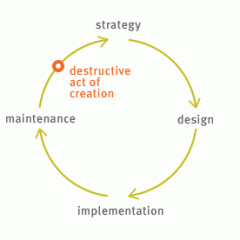
As you may have heard, the Department of Justice is looking into opening an antitrust case against the Big 6 publishers and Apple for allegedly colluding to set prices via an agency model which the publishers set the prices for their books in the iBooks store, not Apple. They were then able to put enough pressure on Amazon to coerce it into accepting the agency model as well, which it had previously resisted. This is why you see ebooks being sold on Amazon for $9.99 or more nowadays.
Now, there’s a contingent of publishers and authors who fear change and have grown complacent and dependent on their IP-based, physical distribution model; they tend to see Amazon as an evil corporation out to destroy publishing, bookselling, and writers.
Scott Turow, president of the Authors Guild — does anyone else find the idea of an authors guild disturbing, like modern-day feudalism? some would say the same about the Big 6 publishing houses — recently wrote an open letter speaking out against the antitrust investigation and in defense of the agency model. Quelle surprise! Though it’s ironic to see someone defending big corporations against antitrust investigations who, under normal circumstances (i.e., ones in which his bottom line isn’t directly affected), would probably be in favor of antitrust suits against monopolistic big corporations.
Anyway, Turow types some rather outrageous falsehoods about Amazon. Indie powerhouses Barry Eisler and Joe Konrath1 do a pretty god job of showing how ridiculous Turow’s claims are. Richard Lea summed it up on Twitter with question that makes up the first half of this blogpost title: “Can a bookseller destroy bookselling by selling lots of books?”
I do disagree with Eisler and Konrath on one thing, however, and that is their opposition to the collusion between Apple and the Big 6 publishers. As a libertarian, I don’t have a problem legally speaking with collusion, or price fixing. Without government support, cartels are unsustainable. Of course, believing some practice shouldn’t be illegal doesn’t mean I approve of said practice.
[continue reading…]
Help Promote Prometheus Unbound by Sharing this Post
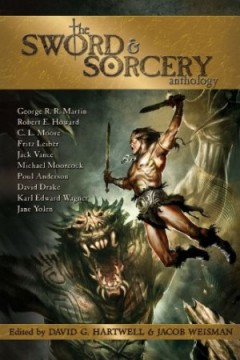
If you like your fantasy gritty, violent, personal, and character-driven, featuring flawed antiheroes, then you’ll want to listen to these two fascinating three-part series of podcast episodes on SF Signal.
Hosted and moderated by Patrick Hester and Jaym Gates, the panels include noted authors, editors, and artists, such as Lou Anders, Scott Lynch, James Enge, Saladin Ahmed, John Picacio, and many more.
The discussions are wide ranging: The panelists discuss what makes a story sword & sorcery (do you agree with Lou?), the proper length of a sword & sorcery story in prose form, and what the boundaries between sword & sorcery, sword & planet stories (Edgar Rice Burroughs’s John Carter), epic fantasy, and urban fantasy are. They talk about the new sword & sorcery (by authors Scott Lynch, Joe Abercrombie, James Enge, Michael Chabon, and others) in relation to its progenitors in the classic pulps (Robert E. Howard, Fritz Leiber) and the more mature work of Michael Moorcock, the proliferation of sword & sorcery into non-Western settings (e.g., sword & sandal stories by Saladin Ahmed and Howard Andrew Jones), and sword & sorcery in different mediums, such as film (Conan), table-top roleplaying games (D&D), contemporary video games (Skyrim), and art (Boris Vallejo).
After listening to all of these episodes, what’s your take on sword & sorcery?
[continue reading…]
Help Promote Prometheus Unbound by Sharing this Post
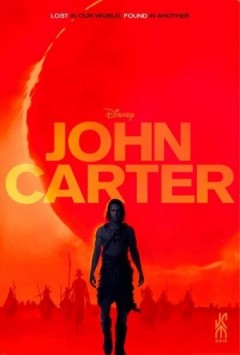
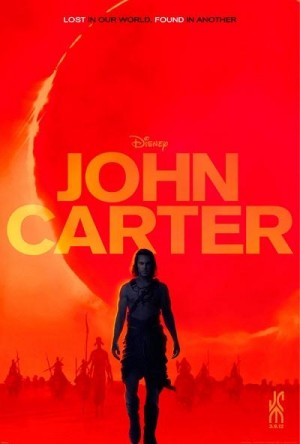 There is a certain charm to the recently released John Carter, helmed by Andrew Stanton. The two leads, Taylor Kitsch’s John Carter and Lynn Collins’s Dejah Thoris, have enough chemistry to draw the audience in; the world of Mars itself is a treat for the eyes; the basic plot is well within the bounds of standard epic adventure but perfectly sound; and many of the situations that the characters find themselves in have real potential, albeit never fully realized. In short, there was a grand story there for the telling, had there been a director capable enough to pull it off. There was not, and consequently a theatergoer is likely to leave feeling frustrated by the large gap between what was and what might have been.
There is a certain charm to the recently released John Carter, helmed by Andrew Stanton. The two leads, Taylor Kitsch’s John Carter and Lynn Collins’s Dejah Thoris, have enough chemistry to draw the audience in; the world of Mars itself is a treat for the eyes; the basic plot is well within the bounds of standard epic adventure but perfectly sound; and many of the situations that the characters find themselves in have real potential, albeit never fully realized. In short, there was a grand story there for the telling, had there been a director capable enough to pull it off. There was not, and consequently a theatergoer is likely to leave feeling frustrated by the large gap between what was and what might have been.
After a useless prologue that actually ruins the later effect when the protagonist appears on Mars for the first time, we are introduced to John Carter, a former officer of the Confederacy and current gold prospector. When the United States army tries to conscript him to fight the Apaches in Arizona, he tells them he owes them nothing and prefers to go about his own business. This defiance of the state should not excite the libertarian too much, however, because just moments before, he was busy abusing the rights of a shop owner, refusing to leave the man’s store when he wouldn’t sell. Carter’s reticence to join and fight, it turns out, is more about his bleak personal cynicism after the deaths of his wife and child than it is about a freedom-friendly moral code.
In the course of his attempt to escape the clutches of the war machine, he stumbles upon a cave where he is ambushed by a strangely dressed man with seemingly magical powers (the reason for the ambush is never made clear, though one cannot help but notice that the plot would have come to a standstill without it). After killing the ambusher, Carter takes a medallion from his cadaver and gets transported to a strange land he eventually learns is the planet Mars. He discovers he has extraordinary new powers with which he amazes some of the creatures he finds there.
Eventually, he meets a woman, a princess, fleeing an arranged marriage that could stop a war between two city-states. She wants to use him and his incredible physical prowess for her ends, which are to save her city-state from destruction without getting married; he wants to use her for his, which are to return to Earth with the help of her esoteric knowledge of his amulet. They form a distrustful alliance and adventure ensues. I’ll leave it to the reader to guess whether or not they fall in love.
[continue reading…]
Help Promote Prometheus Unbound by Sharing this Post
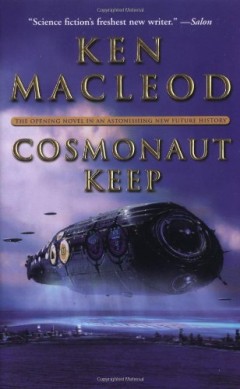
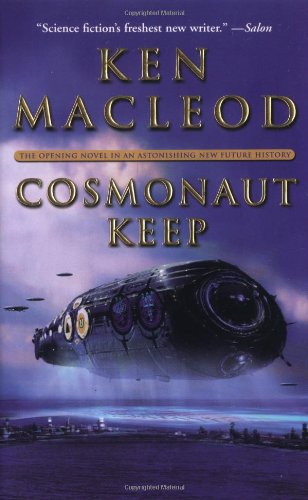
Cosmonaut Keep is the first book of the Engines of Light trilogy by Ken MacLeod, combining space opera with a unique take on the ufo mythos and a variety of leftist and libertarian political perspectives. It is told in two widely different alternating timelines, both focusing on the dream of interstellar travel.
The first timeline is set in a near-future Edinburgh, in a world where a neo–Soviet Russia has beaten back the United States and installed a kinder, gentler socialism in Europe. Matt Cairns is a computer programmer, and a member of the International Workers of the World Wide Web (or Webblies). He stumbles upon a group of American libertarians trying to overthrow the Party for fun and profit, and ends up carrying a mysterious data disk containing what appear to be plans for light-speed travel and an antigravity spaceship. Meanwhile, a rebellious European space station claims to have made first contact with aliens within an asteroid.
The second timeline is set on Mingulay, a planet in the Second Sphere, an ancient multispecies civilization. The two oldest species are the krakens and the saurs, both millions of years old. The krakens (bioluminescent and intelligent giant squid) navigate the lightspeed starships that ply the Second Sphere, while the saurs (secretive beings descended from bipedal dinosaurs who look suspiciously like the Greys of ufology) pilot gravity skiffs (read: flying saucers). In addition to two other species of hominid, there are also humans descended from those abducted from Earth by the saurs and taken to the Second Sphere over the millenia. Above all are the gods, superintelligent communities of extremophile bacteria who live in comets and asteroids, whose one and only commandment is “Leave us alone!” In this timeline, we follow Gregor Cairns — a member of the Cosmonaut Families, the descendents of the crew of a human-piloted starship from Earth — whose family has been working secretly on an interstellar navigation problem for two hundred years.
[continue reading…]
Help Promote Prometheus Unbound by Sharing this Post
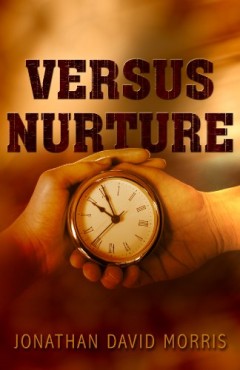
In the interest of full disclosure, here are the books we received in February.
Help Promote Prometheus Unbound by Sharing this Post
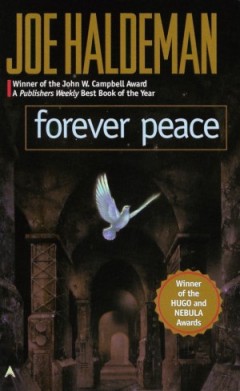
When Joe Haldeman, early in his career, penned his 1970s science fiction classic The Forever War, he claimed his niche in the genre. Whatever happened after that, however well or poorly he performed, however much or little he expanded his legacy, his place at the table was secure. The general consensus is that, despite a career with several successes, he has never managed to equal that early novel. My experience with Mr. Haldeman is too limited to opine on that point, but I can say that in 1997, when he wrote Forever Peace, he definitely fell short but did not miss by a large amount.
Julian Class, a physicist and conscript in the American armed forces, is the protagonist of a story that transpires in the 2040s. The United States, now turned into a centrally planned economy, is at war with guerrillas all over South America and Africa. The principal weapon on the ground is the soldierboy, a deadly robot used for anything from patrolling to reconnaissance to assaults and assassinations. The soldierboys are remote controlled by soldiers like Class who are “jacked in” to the soldierboy through a plug surgically inserted into their brains, Matrix-style (perhaps it would be fairer to say Neuromancer-style).
An entire squad of soldiers controlling the soldierboys attain a oneness with each other, such that everyone’s feelings, thoughts, and experiences are collectively shared. More than simply walking a mile in another’s shoes, this jacking is akin to walking an entire life in another’s shoes, socks, pants, underwear, and t-shirt. At one point Julian Class, who is black, reflects that there is no racism among these soldiers, because it simply is not possible to be racist when you have essentially been another race, or several other races, for days at a time. This idea anticipates a larger revelation made later, which becomes the main point of the book.
[continue reading…]
Help Promote Prometheus Unbound by Sharing this Post











